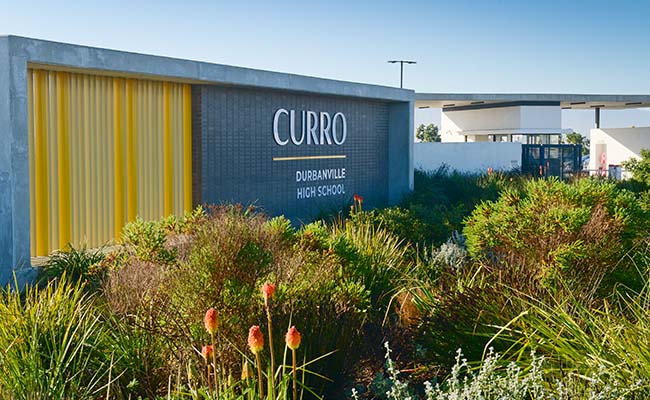“Think big!” was the oft-repeated maxim of Jannie Mouton, a man known as the “Boere Buffett” and the founder of financial services company PSG.
So it is perhaps no surprise that his family’s new gambit is a R7.2bn offer to buy out shareholders in schools group Curro, to be housed in his family’s charitable trust. It would rank as perhaps the single largest donation in South African history – a legacy-defining deal if ever there was one.
Mouton is already something of a legend in the business sector, not least because it was PSG that helped incubate the mighty Capitec – which this week dethroned FirstRand to become the country’s most valuable bank. Capitec, not that anyone needs reminding, has made PSG’s shareholders extraordinarily rich: a R10,000 investment when it listed in 2002 would now be worth R12m.
Curro was one of Mouton’s other big ideas, as was tertiary schools group Stadio, agri-business outfit Zeder and PSG Financial Services. But in 2018, Mouton was diagnosed with dementia, and he stepped back from public life. His son, Jan Mouton Jnr, tells Currency that his father is now quite ill and the family wished to make a grand gesture within his lifetime to benefit South Africa.
The idea first surfaced when the trustees of the Jannie Mouton Stifting were toying with the idea of building a school of skills in Stellenbosch, with a budget of about R100m. Instead, they figured, why not buy all the schools that Curro owns and use that as the vehicle to advance their dream of extending quality education to as many children as possible.
“The foundation had this share portfolio and we thought: are we fulfilling our duties if we sit on this big endowment or can we do more? And this is a way of buying 189 well run schools in one go to do something great,” says Mouton Jnr.
He believes shareholders will back the bid given the 60% premium at which it’s been offered, not to mention its altruistic intent. After the news emerged on Wednesday morning, the share rocketed 50% to R12.04 on the JSE – still a little shy of the effective R13 per share being offered.
It will likely end a wild ride on the JSE in which Curro became one of the most hyped stocks of the past 14 years. Listed in 2011 at R4 a share, by December 2015 Curro shares were trading at just below R60 – a gain of 1,400%. The promise was huge: take advantage of South Africa’s crumbling state school system by rolling out new schools and watch the money flow in as learners stampeded through the school gates.
Curro embodied the “hockey stick” investment thesis. But then reality bit; by November 2017, the share tumbled sharply in what smalltalkdaily founder Anthony Clark describes as its “one way slide to hell”, bottoming out at R4.62 in the 2020 Covid crash.
Since then, Curro has traded “in a very narrow range, and in those five years we’ve had very lacklustre earnings”, says Clark, who has argued for the past two years that Curro would underperform its closest JSE-listed peer, AdvTech, given its high debt and poor utilisation of its assets.
Clark wasn’t wrong. AdvTech has been one of the unsung stars of the exchange: it listed at 18c a share back in 1987, and this week touched R33 – a gain of 10,514% since. It’s not quite Capitec, but it’s mighty impressive nonetheless. This week, AdvTech announced a 10% rise in its revenue to R4.6bn for the six months to July, thanks to a solid performance from its portfolio of schools which include Crawford International, Trinityhouse Schools and Abbotts Colleges. Its profit climbed 15% to R640m.
This underscores why investors were so excited when Curro joined the JSE 14 years ago. “When the schooling sector only had AdvTech as a comparator, and knowing how well it had done, of course the stock had a helluva run,” recalls Clark, himself a victim of the frenzy.
Strings attached
Despite the roller coaster, had you bought Curro shares on its debut and also held onto the tertiary education business Stadio, which was spun out of the business in 2017, you’d have still done well. Stadio is now trading at a record high of R9.88.
But as fellow small-cap watcher and Element Investment Managers founder Keith McLachlan says: “Just because something is listed and everyone is excited, doesn’t mean you need to hold it.”
McLachlan believes Mouton’s trust will make a “wonderful” home for the private schooling group, representing a great outcome for the country. For shareholders, it may seem fabulous, but there are strings attached. The R13 per share offer consists of just R0.85 in cash, with the balance to be paid in Capitec and PSG Financial shares. Moreover, the offer only narrowly tops Curro’s net asset value of R12.93 per share.
“Curro shareholders now have Capitec risk. If you didn’t already hold Capitec, do you actually want to hold Capitec? Because that is what you are getting,” McLachlan says.
Financial mechanics aside, the buyout may be the most elegant way to resolve two conflicting impulses: creating a capital-heavy schools group that serves a public good, versus delivering juicy shareholder returns.
For Clark, there are mixed emotions. “I am always sorry as a small- to mid-cap analyst to see any company delist from the JSE when we need more listings. But the very fact that Curro has patently underperformed its own expectations for a number of years has perhaps jaundiced the market, so the offer might have a reasonable chance of success,” he says.
Curro’s ambitions certainly came at a huge cost. Schools were built out at a frantic pace, necessitating six rights issues since its initial JSE listing. In all, the company spent close to R14bn on its expansion since inception, which must be seen against the buyout price tag of R7.2bn.
Nor has this translated into an immensely profitable business. In Curro’s latest results for the six months to July, published this week, its earnings growth was flat, while revenue only inched up 5% to R2.7bn. And the number of learners at its schools slipped 1% to 71,749 children.
Curro CEO Cobus Loubser doesn’t really buy the suggestion that you need to sacrifice purpose to make a profit. “When we need to eat, there’s no problem with Shoprite making a margin, but anybody else wanting to make a profit out of a vital and valuable service is vilified,” he says.
Still, Loubser concedes that a business like Curro may need more time to deliver the returns that excitable investors banked on years ago.
“Perhaps the kinds of things that would have taken us 10 or 20 years to do may now be achievable in a shorter timeframe,” he says, since Curro will now not be required to fork out cash for dividends or share buybacks.
Asked whether Curro is behind its earnings forecasts, Loubser says: “If it wasn’t for the extent to which we’ve gone backwards in our learner numbers this year we would have been right on track.”
The operating profit margin actually improved by nearly 4% since 2021, he says.
Worthwhile sacrifice
Higher interest rates have evidently hurt middle-class households – Curro’s target demographic – but Loubser rejects the view that South Africa’s middle class has been “wiped out”, as some analysts have claimed. “Is there distress and do families have to spend more? Sure – but I think we’re in a cyclical moment, and the reality is that what we offer as a service is an essential building block for anybody’s future and families make incredible sacrifices to pay for it,” he says.
Curro’s job is to make sure the service it offers is worth the cost. Clark, for one, believes Mouton’s buyout bid will succeed.“There was a sense of disquiet among many institutional shareholders regarding the earnings and the huge impairments; they’ve impaired R743m in two years on underperforming schools,” he says.
If anything, Curro is likely to need more impairments, given the stagnation of student numbers, and the pressure on parents.
But there is one abiding irony which Clark can’t let pass unnoticed: back in July 2015, Curro made an unsolicited “cheeky” bid for AdvTech, of R13 per share. AdvTech fought this offer off — and yet here we are, with Curro itself now on the brink of leaving the JSE at precisely that price.
This story was produced in partnership with Stanlib.
Top image: supplied.
Sign up to Currency’s weekly newsletters to receive your own bulletin of weekday news and weekend treats. Register here.














Were Loubser a part of the middle-class, he would have struggled to make ends meet in the last three months since electricity increases. My winter usage in 2008 cost me R170p/m. 2024 R1900p/m and my July bill was R3946 with one geyser, no electric heaters and cooking on gas
Reply